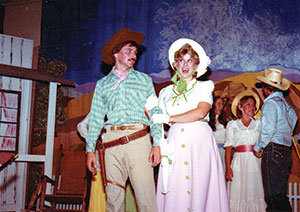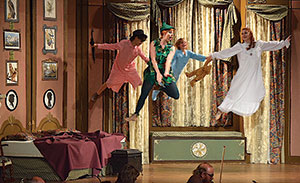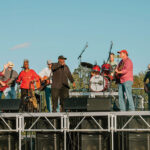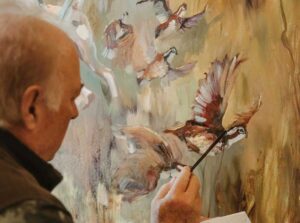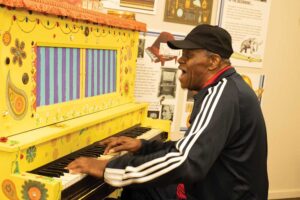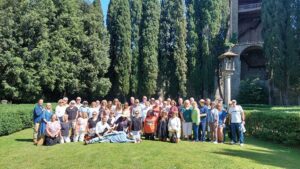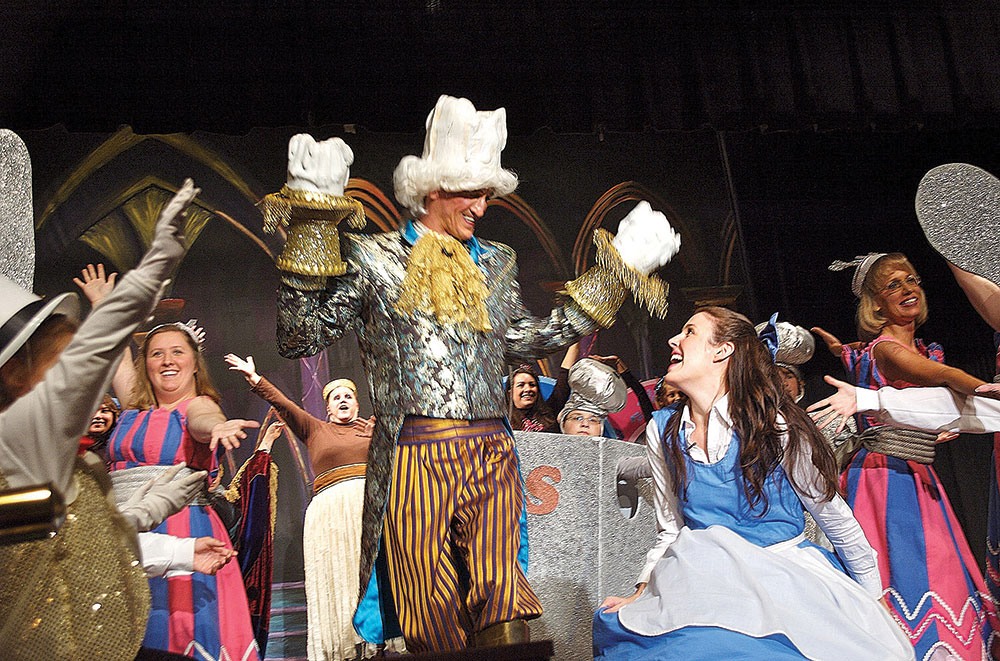
Still getting rave reviews after 47 years
Story by Paul South
Submitted photos
For 47 years, the story of the Springville Community Theater has been stagecraft by “the seat of the pants,” according to founder June Mack.
Think a line from something like one of the classic Mickey Rooney-Judy Garland movies: “Hey gang, let’s put on a show.”
Everybody contributes. Everybody performs.
SCT is a small volunteer army of amateur actors, singers, dancers, set builders and ticket takers. The company has few rules: Check your ego at the stage door, no divas allowed and get ready to have fun and work hard.
That’s been the story of the theater troupe since Mack started it in 1976 after graduating from Hollins College, and her summer job fell through.
Archie Jones, a neighbor at a nearby farm, suggested that Mack put on a show in Springville. She spent a month writing a children’s fantasy, filled with song, dance and dialogue.
“I put the word out that I needed help to put this thing on, and about 20 people – lifelong friends of all ages – stepped in to be a part of it. We had a blast,” Mack says.
The next year saw another original production that drew 70 cast and crew, including The Shake, Rattle and Roll Senior Citizens Band from Odenville.
“I didn›t exactly know what to do with them so I created a scene with a birthday party so the band (about 25 senior citizens) became the entertainment at the party in the play. They were a real hit.”
Since those initial offerings, Mack, with degrees from Florida State and Harvard, has directed the SCT in a mix of original works and Broadway classics, like Oklahoma!, South Pacific, Beauty and the Beast and Peter Pan.
Mack describes the growing troupe with a single word – brave.
“They’re not afraid to take a risk. Especially if it’s funny or unusual – something that would delight a crowd,” Mack says. “When you describe something to them that you’re thinking of them doing, and it could be embarrassing or even dangerous, they get a glint in their eye like ‘bring it on.’”
Risks, it seems, are part of life on the stage, from New York to community playhouses. But in Springville, the theater has no set script for success.
“No formula, just trying to see if we can do it,” Mack says. “It’s not that we decided we’re going renegade and not have a safety net. We just don’t have a net, or we’d definitely use it. We’ve done things that we knew could turn out catastrophic, but we just had to try — and it always turned out.”
For example, “we did an outdoor performance of Annie Get Your Gun at Homestead Hollow. One of our leads, Madison Forman, decided at age 80 that he’d like to try acting. He was great. To do this show, we braved mosquitoes, record temperatures and humidity plus horses, lots of kids, gunshots, fireworks and longhorn steers. Plus, we moved the audience from scene to scene instead of changing the scenery, which meant relocating sound, lights and orchestra as we moved to the settings around Homestead Hollow. Just had to try it.”
One of the foundations at Springville Community Theater is that everyone who auditions is cast. Locals from ages 4 to 85 have basked in the applause of joyful audiences. “It’s amazing what people can do when you tell them they can,” Mack says.
“We’ve had 100 (exactly) people audition for several of our shows, and since we cast every person, that meant a cast of… yep, 100. We’re not trying to grow a theater program. We just want to do fun, creative things in front of our families and friends.
“Recently, we gathered old cast and crew lists to create a spreadsheet of everyone who had worked on our shows, and the number was 970 in 47 years. We were amazed because it’s a small town.”
Mack says that having a community theater isn’t really the important thing – it could be any kind of project that involves a lot of people working together.“The fact that it was theater just means there are a lot of different types of jobs for different kinds of people. So, it’s a very practical device for a community project. And then you present it to the community, and you’ve got participation on every level.”
The seeds for what would become Springville Community Theater were planted in the 1970s at Springville United Methodist Church, where Mack, her mother and siblings created and performed church programs along with other members of the congregation. “It was the time of the hit musical, Godspell, and youth programs everywhere were experimenting with drama, music and movement. I was fortunate to work with a lot of really talented people, and this was the norm all over Springville — not just at the Methodist Church. It’s still true today. It’s a very unusual place.”
What do they think are the secrets behind keeping it going for almost five decades?
In the beginning – for about 10 years – we did a show every year. Now, with the size of our shows, the volunteer staff and crew need a longer break. Spacing the shows is our remedy for burn out. We go off and live our lives, and when we get the itch to do a show, we bring that life energy back to the next play.”
She explains it like this: “The stage really isn’t our lives — it comes out of our lives. We just pretend it’s about the show (these characters, their stories), but it’s really about community, about our stories as we do this other thing called a show.”
From the beginning, she adds, it was a teaching group. “We teach anyone to act, build, paint, run a box office, operate lighting and sound equipment, make costumes, find the right props, be a stagehand. Since nobody gets paid, anyone can volunteer to do anything. We’re sort of the “no rules” theater troupe.”
As for its staying power, she notes, “Incredibly talented people just keep showing up for sets, art, props, costumes, sound and lights. We couldn’t afford these people if we were paying them. But they’ll work for free because the creative atmosphere is super, and they are so appreciated – it just feels good to be a part of these shows.
“It’s incredibly hard work, but these people know that hard work and long hours come with quality art, and they pour themselves into it, teaching others along the way. That continuity of expertise sprinkled through all of the committees has been key to our ability to handle the hundreds of people who head our way now for every show.”
Mack points to other keys to their success. “We have no overhead because we don’t own a building or have a payroll, and this makes it possible for us to have a lot of freedom to do shows when we want to and take risks – risks that come with doing really big shows and a lot of crazy stunts.
“We keep ticket prices as low as we can to make the shows accessible to everyone. We just want to break even – we’re not interested in socking away any money. With donations from the City of Springville, St. Clair County and a few special friends, we’re able to mount extravagant shows with very low ticket prices.
They keep the spotlight trained where it should be, she says. “With less focus on money and sustaining a large organization, we’re able to keep our main goal in sight: process is more important than product. The cool part is that, by focusing on the process, the quality of the product is always amazing.
“We focus on the experience of the people who work on the shows. We want everyone to be proud of themselves, and this expands to the pride and love their families and friends feel for them when they see them on the stage. It’s a beautiful thing.”
Mack taught at UAB from 2001 to 2019, where she led the university’s film program. Before that, she taught at Ohio University, The Ringling School of Art and Design and at Florida State.
For the former college faculty member, Springville Community Theater teaches a powerful lesson. “Doing something that’s fun and wanting to give back to friends, family and community really works out in the long run.”
And after 47 years, how does Mack see the future Springville Community Theater? “More of the same, only, it’s never the same.”











